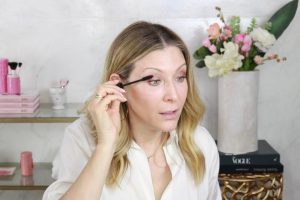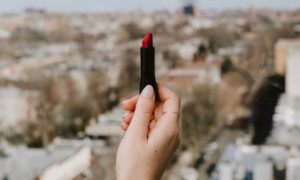Whether for eating, kissing, or talking, the lips get a lot of use 24/7 — and, understandably, experience wear and tear. That might not be an issue if, say, the lips were super-resilient. But that’s not the case.
In fact, the lips have some of the most delicate skin on the body, so they’re vulnerable to dryness, chapping, peeling, and flakes. As a result, “dedicated lip care is more important than you would think,” says NakedPoppy skin specialist Tara Parenti. And it’s especially vital in the winter, during which air is particularly dry — although lip care is essential year-round.
Because not only are soft, smooth lips just more comfortable, but your lips are just as front-and-center as the rest of your skin, too, which is why it’s worth keeping them healthy. Plus, healthy lips can make or break a bright lip color; nothing undercuts the bold statement of red lipstick quite like the skin peeling off. (Also, ouch.)
Here, what lip care entails (and why):
- Lips lack the same protective lipid barrier and sun protection as the rest of skin
- Weather, medications, and behavioral factors (like lip-licking) can dry out lips
- Your lip-care routine should entail a lip balm or lip mask, lip scrub, and lip balm with SPF
- A clean formula is a must for the lips, since it’s easy to ingest the formula
- Look for balms made with plant butters and oils—and without irritating ingredients
With that in mind, here’s what to look for in your lip products, and why they’re so important.
What makes the lips different
“The lip skin has unique characteristics compared to the skin on other areas of the body because it is the boundary of the mucous membrane and skin,” says NakedPoppy research scientist Marisa Plescia.
For starters, you don’t get the benefit of the same lipid barrier as the rest of your skin. “Unlike the skin on the rest of the body, the lip skin comprises a very thin stratum corneum, the outermost layer of the skin, with no hair or sweat glands,” says Plescia. As a result, she says, the lip skin has a higher rate of transepidermal water loss and a lower water content than, say, your cheeks. [1]
On top of that, “they also have less pigment, or melanin, which is responsible for protecting our lips from sun damage,” Parenti says. The lack of these protective features — combined with the constant exposure to food, makeup, and more — means the lips require extra consideration.
The most common lip concerns
Parenti often sees dry, peeling, and chapped lips among clients — a far cry from soft, plump lips. “Sometimes the lips are so dehydrated and compromised that they have tears and cuts,” she says. “I also have many clients concerned about the lines and wrinkles around the mouth — as well as lip dullness, due to lack of pigment.”
And it’s not just a seasonal thing, although dry, cold weather — or, on the flip side, extreme heat — can contribute to dry lips, Plescia says. For instance, you might be dehydrated, which can cause dry lips from the inside out. “There are also lifestyle and behavioral factors to consider, such as smoking, lip-licking and mouth-breathing, especially while you sleep,” Parenti says. “Then, there are medical conditions and medications that can result in chronic chapped lips, including thyroid issues, autoimmune disorders, vitamin deficiencies, and even a yeast imbalance.”
FYI: Licking your lip doesn’t hydrate your lips. In fact, it can do more harm than good: “Many don’t realize that this is actually making the condition worse, due to keratolytic enzymes in our saliva that break down our skin,” Parenti says. “It can even cause dermatitis around the mouth.”
What to look for in a lip balm
While lip scrubs and masks abound, lip balms are the usual go-to to restore smooth, pillowy lips. Look for a formula made with oils, butters, or both. “Oils are the main emollient of your lip balm and help moisturize and protect the lips by reducing water loss and providing essential moisturization and nutrients to the lips,” says Plescia, who recommends olive oil, sunflower oil, jojoba oil, and castor seed oil.
On the other hand, she says, “butters, such as shea butter and cocoa butter, have a creamy consistency and add an extra dose of skin softening and soothing.” Plus, they tend to offer extra perks, like antioxidant properties, and add an extra barrier to the lips — ultimately compensating for that weaker stratum corneum.
For daytime, seek out a lip balm with built-in sunscreen. “The lips have fewer layers of skin and less pigment, and are prone to sun damage just as much as the skin on our face,” Parenti says.
On the other hand, you should also keep certain ingredients away from your lips, particularly those that are potentially irritating — think some essential oils, like peppermint and eucalyptus. “These can make the lips more inflamed and dry,” Plescia says. Also, if your lips tend to be dry, take a break from your lip-plumping products, which may contain cinnamon or capsicum, a.k.a. cayenne; their sole purpose is to irritate the lips and trigger a swelling effect, thus plumping them…and also drying them out.
Why a clean lip balm is important
While we think clean beauty is important, full stop, the stakes are especially high when you’re talking about the lips. “Because lip balms are applied near a mucous membrane on the mouth, it can be very easy to ingest small amounts, especially with repeated use,” says Plescia. “This means that the questionable chemicals in traditional lip products can be ingested as well.”
For instance, synthetic fragrances and flavors might taste good, but they “can contain phthalates and other components that can be potentially toxic and irritating to skin, causing allergic reactions or sensitization,” says Plescia.
The same goes for your makeup, by the way. “Lipsticks also can contain BHT and BHA, powerful antioxidants that can help prevent rancidity of oils,” she says. But they’re linked to a variety of health concerns — making them best avoided for anything you’re swiping onto your mouth on a daily basis.
Your ideal lip-care routine
A lip-care routine won’t just keep your lips comfortable, soft, and plump. It can also offer other perks, like helping your lip color go on smoothly — which can be a game-changer when you’re working with certain formulas, like liquid lipstick (which can otherwise highlight every flake and crack).
Start by exfoliating once or twice a week with a lip scrub; Plescia is a fan of Clove + Hallow Lip Polish. “It helps remove dry, dead skin and keeps them silky smooth,” she says. “Remember to not over-exfoliate or scrub too hard, as the skin on our lips is delicate.”
Then, moisturize with a lip balm that contains a blend of humectants, emollients, and occlusives, Parenti says. Try Kosas LipFuel Hyaluronic Lip Balm, which pairs hyaluronic acid with cocoa butter and jojoba seed oil. Looking for something a little glossier? “Castor seed oil is especially excellent in lip care as for its strong occlusive properties, and can add shine and luster,” Plescia says. You can find it in Vapour Lux Organic Lip Conditioner.
If you know you’ll be spending time outside, reach for a lip balm with sunscreen instead. At night, meanwhile, you can also sub in a lip mask like Clove + Hallow Lip Mask; the velvety formula includes vitamin E and a blend of nourishing oils to soften while you snooze.
Ultimately, your lip-care routine is an investment — but it’s one that pays off in both comfort and softness. And even if you stick with a lip balm and call it a day, that alone is an easy way to ensure your smile stays on-point for years to come.






Comments